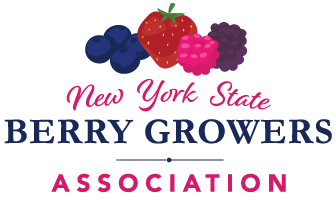By New York State Department of Agriculture and Markets
Unseasonable weather significantly impacted grape growers and other fruit and vegetable crops across the state
STEUBEN CO., N.Y. — State Agriculture Commissioner Richard A. Ball on Friday joined state and local leaders, representatives from the New York Wine & Grape Foundation, New York Farm Bureau, the United States Department of Agriculture Farm Service Agency (USDA FSA), Empire State Development, and Cornell Cooperative Extension to tour several vineyards in the Southern Tier and Finger Lakes regions impacted by a recent freeze. The group visited with grape growers in Steuben, Schuyler, and Seneca Counties to assess the damage in the region and better understand the outlook and plan for recovery.
State Agriculture Commissioner Richard A. Ball said, “Our grape growers haven’t seen frost conditions this late in the season in decades, particularly in the counties we visited. The situation has been compounded by the fact that our growers also faced weather-related challenges last year. It is imperative that we do everything we can to help all grape growers across the State who saw damage to their crops, as well as our other fruit and vegetable growers across the State, to secure the assistance they need to overcome this challenging time. We will continue to work closely with our partners to advocate for assistance to help alleviate the current burden and any long-term economic effects of this damaging severe weather event.”
According to the Department’s Division of Emergency Management and Cornell Cooperative Extension Disaster Education Network (EDEN), during the reporting period of May 15 to 25, 2023, New York State experienced extremely low temperatures, which resulted in frost damage to a number of crops throughout many regions of New York State. In addition to the reports of damage to vineyards in the Southern Tier, Finger Lakes and Hudson Valley, there are reports of crop damage to other commodities in several other regions, including the North Country, Central New York, Capital Region, and Hudson Valley areas.
While Cornell Cooperative Extension continues to survey vineyards and other farms in the area to get a complete picture of the extent of the damage, the USDA FSA offices are standing by to assist growers. FSA staff across the area are already working with partners and producers to document the damage and prepare a disaster declaration request.
The FSA recommends that farmers affected by the freeze should continue to document their conditions (pictures and video) and any losses. Farmers can file a CCC- 576 (Notice of Loss) with their local USDA FSA. Contact information for the offices can be found here.
New York is the third largest grape producer and the third largest wine producer in the country. According to the New York Wine & Grape Foundation, these growers generate a $6.65 billion economic impact for New York State. There are 471 wineries in New York, growing a variety of grapes on 35,000 acres.
Sam Filler, Executive Director, New York Wine & Grape Foundation, said, “The growers and producers behind New York’s vineyards are critical contributors to our agricultural and tourism economy. Facing frost conditions this late in the season can be detrimental to their crops, as well as other growers across the state, which is why we must do all that we can to lessen the damage. We’re grateful for the assistance of the State Department of Agriculture and Markets and the Farm Service Agency for their support in this time and will continue to do all that we can to combat the effects of these extreme weather events for our growers.”
Jim Barber, State Executive Director, U.S. Department of Agriculture Farm Service Agency, said, “New York grape growers suffered unprecedented damage after the May 18 freeze event due to an unusually warm spring that forced the onset of bud development several weeks ahead of normal. Joining Commissioner Ball in discussions with the growers, we talked about existing programs, such as low interest emergency loans from the USDA, and the importance of state and federal agencies working together to support our farmers through times of economic stress.”
Hans Walter-Peterson, Senior Viticulture Extension Specialist at Cornell Cooperative Extension, said, “While isolated frost or freeze events are not uncommon here, this freeze event in the Finger Lakes impacted the majority of vineyards in the region. Damage estimates are anywhere from 5 – 100%, so the impacts vary significantly depending on location. At this point, we have to wait and see what kind of crop might emerge from secondary shoots that emerge after this damage in order to assess how much of an impact this freeze will have on growers’ yields.”
Assemblyman Phil Palmesano said, “We have been in close contact with Commissioner Ball and the Governor’s office since last week’s frost and we welcome Commissioner Ball’s visit to see the damage and to hear firsthand from regional growers and producers about what they’re facing on the short- and long-term impact. The vine damage is extensive and it is going to have a dire effect on vineyards and wineries that are fundamental to our local economies. These are major economic engines. It is imperative that we immediately initiate a collaborative effort, at every level of government, to help deliver the assistance, resources, and support needed to help one of New York State’s most vital and productive industries recover.”
Senator Tom O’Mara said, “This is an unprecedented frost for grape growers throughout our region. The widespread vine damage will result in devastating losses for many growers and have a detrimental impact across this state’s vital Finger Lakes wine industry. It will be critical for all of us, at every level of government, to deliver the resources necessary to assist growers and the industry as a whole recover throughout the year ahead. We appreciate Commissioner Ball for surveying the damage firsthand and we stand ready to work with him to initiate a swift response from the state and federal governments.”



